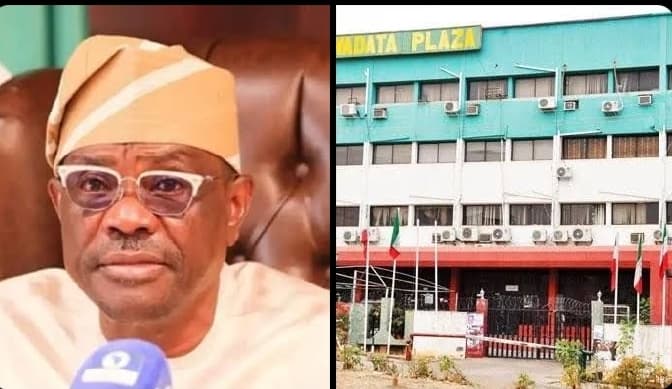In a move that has sent shockwaves through Nigeria’s political landscape, the Minister of the Federal Capital Territory (FCT), Nyesom Wike, has ordered the sealing of the national secretariat of the Peoples Democratic Party (PDP) in Abuja, alongside 4,792 other properties, starting Monday, May 26, 2025. This unprecedented action, rooted in the revocation of land titles for non-payment of ground rent, has sparked heated debates about governance, legal authority, and political motivations.
The Revocation of Land Titles
The FCT Administration, under Nyesom Wike’s leadership, announced in March 2025 the revocation of titles for 4,792 properties in Abuja, citing non-payment of ground rent spanning from one to 43 years. Among the affected properties is the PDP’s national secretariat, a prominent political landmark in the capital city. According to the FCT Administration, the PDP has failed to pay ground rent for 20 years (2006–2025), accruing significant arrears. The revocation also targets other high-profile entities, including the Central Bank of Nigeria (CBN), the Independent National Electoral Commission (INEC), the Nigerian National Petroleum Corporation (NNPC), and various private organizations and individuals.
The legal foundation for this action lies in the Land Use Act of 1978, which governs land administration in Nigeria. The Act vests all land in urban areas under the control of the state governor or, in the case of the FCT, the FCT Minister. Ground rent is a statutory obligation for property owners, and failure to pay can result in the revocation of the Certificate of Occupancy (C of O). Wike’s administration has emphasized that the revocation is not selective but applies uniformly to all defaulters, regardless of their status or influence.
In a public statement, the FCT Administration clarified that the affected properties have reverted to the government, and starting May 26, 2025, officials will take immediate possession by sealing the premises. This move has raised questions about the enforcement of land regulations, the financial health of major institutions, and the potential for political targeting in a highly polarized environment.
The PDP’s Response
The PDP, one of Nigeria’s leading opposition parties, has strongly condemned Wike’s directive, describing it as a deliberate attempt to suppress opposition voices ahead of the 2027 general elections. The party’s national leadership argues that the sealing of its secretariat is not merely an administrative action but a calculated move to weaken its operations and influence. In a press conference, PDP officials questioned the timing of the revocation, noting that the party has occupied the secretariat for decades without prior issues over ground rent.
The PDP’s concerns are not without context. Nyesom Wike, a former governor of Rivers State and a prominent PDP member until his defection to the All Progressives Congress (APC) in 2023, has been a polarizing figure within the PDP. His appointment as FCT Minister under President Bola Tinubu’s APC-led administration has fueled speculation about his motives, particularly given his history of intra-party conflicts within the PDP. Critics argue that targeting the PDP secretariat could be an extension of political rivalries, especially as the party seeks to regroup and challenge the APC in future elections.
The PDP has also raised concerns about the broader implications of the revocation. The party’s secretariat serves as a hub for its national operations, including strategy meetings, policy formulation, and coordination with state chapters. Sealing the building could disrupt these activities, potentially hampering the party’s ability to function effectively. Furthermore, the PDP has called for transparency in the revocation process, demanding a detailed breakdown of the alleged arrears and an opportunity to rectify any payment disputes.
Starting Monday, May 26, 2025, FCT officials will begin sealing the affected properties, including the PDP national secretariat. The process is expected to be highly visible, with media coverage likely to amplify the controversy. Property owners have been urged to settle their outstanding ground rent and penalties to avoid losing their properties permanently. However, the feasibility of resolving such long-standing debts within the given timeframe remains uncertain.
The PDP has vowed to resist the sealing of its secretariat, potentially through legal action or public protests. Other affected organizations may follow suit, leading to a protracted standoff between the FCT Administration and property owners. The outcome of this exercise will likely shape perceptions of Wike’s tenure as FCT Minister and could influence the political dynamics leading up to 2027.


